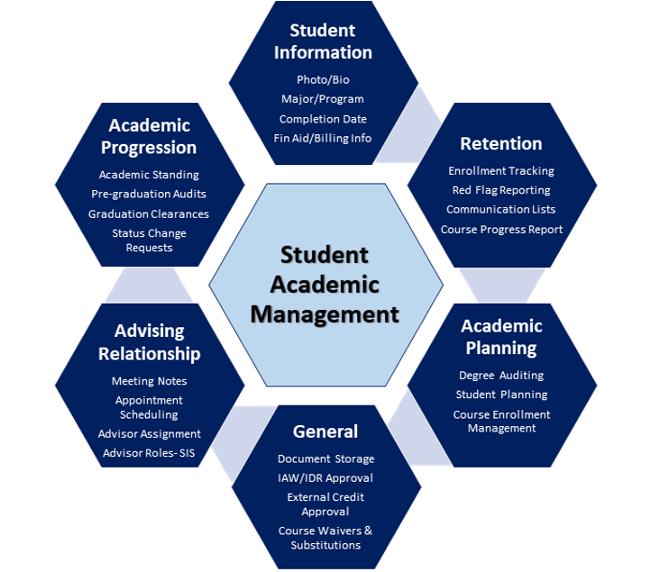Academic advising is one of the six functional areas in the scope of the Student Services Excellence Initiative (SSEI). Advising interacts with a wide range of student organizations and services, including all other SSEI functional areas. Academic advisors often serve as a natural first line of contact for students, referring students to other resources and services as needed.
Academic advising models across the university divisions and units are diffuse and tailored to the needs of specific populations. By and large, undergraduate advising models tend to be more based on developmental supports and interventions for students adjusting to life in a higher education setting. Graduate and professional program advisors tend to be less prescriptive in advising students, opting instead to focus on connecting students and learners with resources they can utilize to achieve their academic goals. Some units have highly centralized advising models with dedicated academic advising staff and program managers; in other places, academic advising is primarily the purview of faculty.

Regardless of advising model, at every division there are student academic management tasks that are required to support the academic experience needs of students – whether these are performed by academic advisors, faculty, academic program managers, student affairs staff, or others.
SSEI is actively working with a group of academic advisors, program coordinators and managers, enrollment managers and other student academic managers from all divisions and levels, in partnership with the Office of the University Registrar and University Student Affairs. The charge of this working group is to gather comprehensive requirements and explore technology solutions that would support the infrastructure necessary for academic advisors and affiliates to perform baseline student academic management tasks.
Advising approaches vary according to population served, as well as nuances particular to divisions and programs. That said, there are tasks common across all programs and levels that are necessary and critical to supporting students and learners as they progress along their academic journeys.

Throughout the course of Fall 2021, SSEI and working group members worked extensively to gather requirements for baseline functions necessary to support academic advising relationships and overall student academic management. These requirements were then prioritized according to strategic overall importance as well as urgency of need (due to lack of existing support or resources for said function). The recommendations of greatest priority can be categorized into three main “buckets” of work:
In Spring of 2023, the working group put these recommendations into an official Request for Proposals (RFP) and evaluated various vendors on the market, including vendors whose systems were currently in use in some capacity at JHU. Based on extensive feedback from various stakeholders across the university enterprise, and multiple rounds of review, the working group elected to award Stellic as the winning proposal. The university-wide contract with Stellic was officially signed in May of 2023.
“Loved that the system was for the most part seems self-explanatory and the added features makes it helpful compared to our current system.”
— School of Education, master’s student
“Stellic has a modern and responsive user interface…I urge the university to switch to this application.”
— Whiting School of Engineering, faculty member
| Outcomes to Date: | Next Steps: |
| – Established university-wide working group to gather comprehensive technical requirements in 16 baseline student academic management tasks – Gathered comprehensive requirements and identified recommendations for investments in three major technology areas: workflow support, advising CRM and degree audit / academic planning – Selected new platform to address major areas of need, Stellic | – Beginning phases of configuration and implementation of Stellic across the university enterprise – Establish ongoing governance of Stellic from a degree-audit perspective and from an advising / student success and retention perspective |